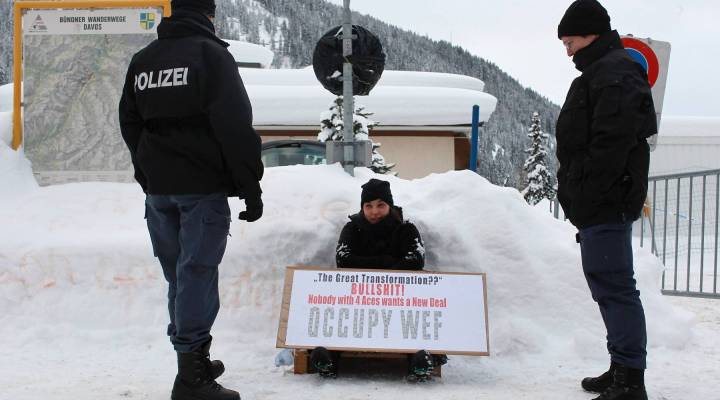
At Davos, focus on more than just the euro
Share Now on:
At Davos, focus on more than just the euro

Stacey Vanek Smith: U.S. Treasury Secretary Timothy Geithner is in Davos, Switzerland today at the annual World Economic Forum. Today, he reassured world leaders that the U.S. economy is growing — albeit slowly. Today’s a big day in Davos — finance ministers from Spain and the European Union are discussing growth in the global economy.
Nancy Koehn is an historian at Harvard Business School. She’s in Davos and joins us now. Good morning, Nancy.
Nancy Koehn: Good morning.
Smith: Part of your research focuses on entrepreneurs and leaders and how they interact. Is a conference like this helpful to them?
Koehn: The answer is yes. But I think there’s something more that’s quite important. I was thinking that if you were just starting a business, how valuable it would be to get here, and — if you will — widen the ingredients set in your kitchen, right? If you thought you were baking with chocolate chips and brown sugar and butter, here there’s also coconut, and raisins, and granola, and all kinds of ingredients you might not have thought to put in those cookies. And that may be the biggest contribution that something like this makes, particularly for the young.
Smith: I’m curious about some of the changes being talked about this year. It’s a year when the 99 percent and the 1 percent have been in so much discussion, as well as issues like the debt crisis and the housing crisis. What are some of the changes being talked about at Davos?
Koehn: In session after session here, the question being asked is: what kind of capitalism? How do we get the best of what it can do around creating jobs and possibilities for people around the world, but make it better and fairer and much more sustainable — not only to humans, but to our planet and to all the creatures that inhabit it. Those questions are absolutely fair game; they’re as much on people’s lips as what’s going to happen with the euro, and what will happen to the European union.
Smith: Nancy Koehn is an historian at Harvard Business School. Thank you Nancy.
Koehn: A real pleasure, Stacey.
There’s a lot happening in the world. Through it all, Marketplace is here for you.
You rely on Marketplace to break down the world’s events and tell you how it affects you in a fact-based, approachable way. We rely on your financial support to keep making that possible.
Your donation today powers the independent journalism that you rely on. For just $5/month, you can help sustain Marketplace so we can keep reporting on the things that matter to you.


















